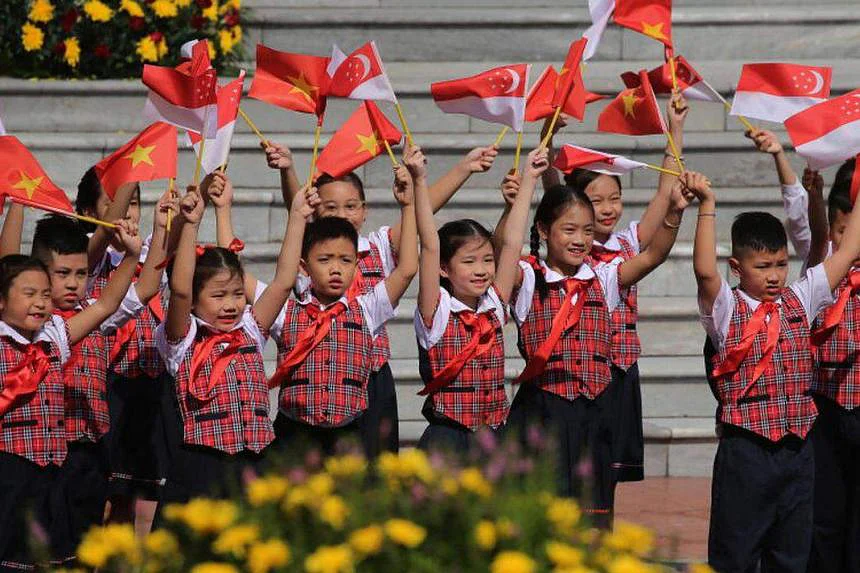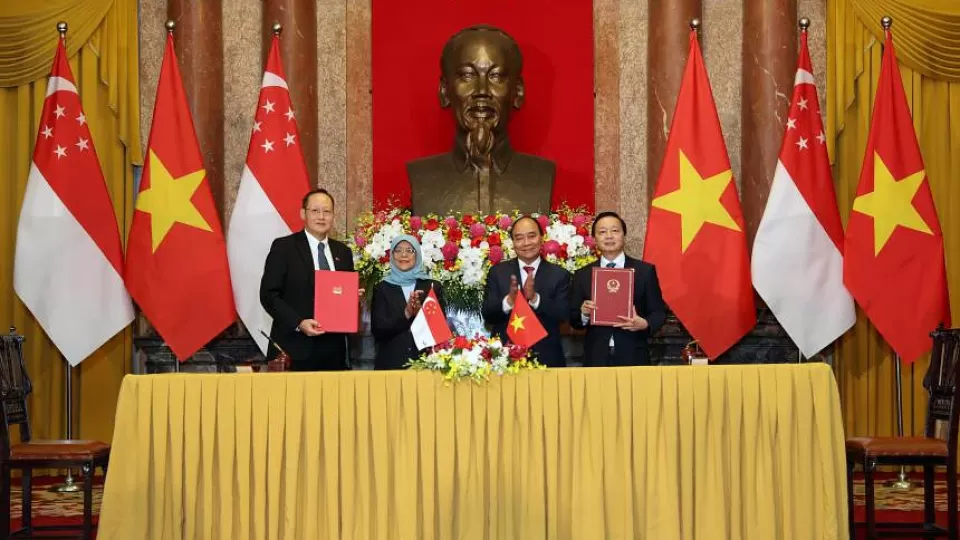October 18, 2022
SIGNAPORE – Singapore may be able to trade renewable energy with Vietnam and work with Hanoi on carbon credit projects under new agreements inked between the two countries on Monday morning.
At the Presidential Palace in Hanoi, President Halimah Yacob and Vietnam’s President Nguyen Xuan Phuc witnessed the exchange and signing of four memorandums of understanding, two of which were on energy cooperation and carbon credits collaboration.
Speaking at a state banquet later on Monday night, Madam Halimah listed sustainability as a key promising area of cooperation between the two countries, calling climate change the key planetary challenge of this century.
“Managing it will require governments and businesses to harness their collective will and resources,” she said. She added that collaborations in renewable energy, sustainable infrastructure, carbon credits and green financing will allow both Singapore and Vietnam to achieve their goals in the green energy transition.
Madam Halimah, who is in Hanoi on a five-day state visit that ends on Thursday, called Singapore and Vietnam like-minded and trusted partners who are both committed to upholding Asean unity, promoting an open and rules-based order and deepening regional economic integration. Both countries have also enjoyed close cooperation in issues such as public health and sustainability through Asean.
“As global travel resumes, I hope that we can continue to enhance our education, tourism and cultural exchanges,” said Madam Halimah. She added that Singapore’s education institutions are eager to deepen their understanding of Vietnam through exchange programmes and study visits.
Both the MOU on energy cooperation, which seeks to advance energy collaborations between the two countries and reduce carbon dioxide emissions, and the MOU on carbon credit collaboration, were signed by Manpower Minister and Second Minister for Trade and Industry Tan See Leng.
Signing these respective MOUs on Vietnam’s behalf were Industry and Trade Minister Nguyen Hong Dien and Natural Resources and Environment Minister Tran Hong Ha.
The MOU on energy cooperation covers the development and financing of renewable energy as well as interconnectors for increased grid resilience and stability and cross-border electricity trading.
It also paves the way for collaboration on liquefied natural gas and electricity markets, as well as research and development and the deployment of low-carbon energy technologies and solutions. These solutions include hydrogen, ammonia, energy storage systems, smart grids and related infrastructure, as well as energy efficiency and carbon services.
A separate MOU was signed over collaboration on carbon credits and carbon markets, aligned with Article 6 of the Paris Agreement, which allows countries to transfer carbon credits earned from reducing greenhouse gas emissions to help them meet their climate targets.
Singapore aims to reach net-zero emissions by or around mid-century, and Vietnam has similarly announced its target of net-zero emissions by 2050.
The agreement aims to develop a legally binding and bilateral framework for the transfer of carbon credit and to identify potential carbon credit projects.
On Monday morning, President Halimah met President Phuc at the palace. During their meeting, she stressed the importance of the Singapore-Vietnam relationship, with both sides set to mark the 50th anniversary of diplomatic relations between them in 2023.
Two other MOUs were inked on Monday. One of these agreements involves Singapore and Vietnam exchanging information on cyber security, cyber attacks and cybercrimes to prevent and detect such threats.
The other agreement involved Singapore’s Institute of Technical Education and Vietnam’s Directorate of Vocational Education and Training collaborating on technical and vocational education and training. Some areas this will cover are leadership and governance, infrastructure development, capacity building, as well as quality enhancement of technical and vocational education and training in Vietnam.
An investment licence for a 12th Vietnam-Singapore Industrial Park (VSIP) in Vietnam’s Can Tho City was also approved on Monday. The investment licence for the 293.7ha industrial park in Can Tho was presented to the chief executive of Sembcorp Development, Mr Kelvin Teo.
Madam Halimah is scheduled to tour the VSIP in Bac Ninh province during her state visit. The 635ha township and industrial park broke ground in 2007 and has attracted 125 companies with US$2.5 billion (S$3.5 billion) in investment capital and created 40,000 employment opportunities, said Sembcorp on Monday.

Vietnamese children wave flags ahead a welcome ceremony of Singaporean President Halimah Yacob at the Presidential Palace in Hanoi, Vietnam, on Oct 17, 2022. PHOTO: EPA-EFE
On Monday afternoon, President Halimah met Prime Minister Pham Minh Chinh and Communist Party of Vietnam Central Committee General Secretary Nguyen Phu Trong.
President Halimah and PM Chinh reaffirmed Singapore and Vietnam’s like-mindedness in developing digital and green capabilities and agreed to pursue deeper cooperation in these areas.
President Halimah also met National Assembly chairman Vuong Dinh Hue. They welcomed Singapore and Vietnam’s close parliamentary ties, and discussed ways to deepen parliamentary collaboration, said Singapore’s Ministry of Foreign Affairs.
On Tuesday, Madam Halimah will visit Bac Ninh province before travelling to Ho Chi Minh City.


